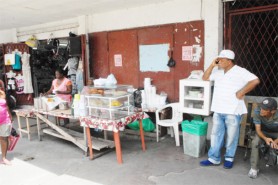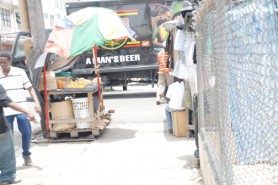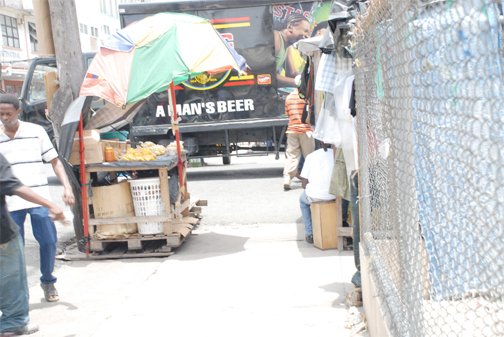– Chief Meat and Food Inspector
The Georgetown municipality’s inability to effectively monitor and regulate the growing practice of urban food vending may be rendering the capital increasingly vulnerable to public health risks according to Chief Meat and Food Inspector Jagdeep Singh.

Stabroek Business has reported in the recent past about the proliferation of unregulated itinerant food vendors in the city as well as evidence of a lack of compliance with public health laws among some privately-run snackettes/canteens in George-town and its environs and Singh told Stabroek Business recently that the limitations facing his department mean that members of the public must shoulder a greater measure of responsibility for the avoidance of health risks by exercising care in their patronage of small itinerant food vendors.
Food vendors and handlers are required to comply with a number of regulatory measures designed to protect consumers from food-borne diseases. Among the requirements for compliance are personal health checks for vendors and handlers by a city-appointed physician with follow-up tests every six months. The issuance of renewable food-handling licences occurs after the tested persons are given a clean bill of health. The Georgetown municipality also conducts regular food and hygiene courses which target newcomers to the sector.
 The challenge confronting the municipality, however despite its thicket of laws and regulations governing the preparation, handling and selling of food in the capital is two-fold. First, high unemployment among the urban poor has led to a significant growth in the informal food vending sector with new, mostly unskilled and untrained ‘entrepreneurs’ pressing their home-cultivated skills into service and, in many cases, either overlooking or ignoring altogether the legal requirements associated with food-handling and food-vending and the training organized by the municipality.
The challenge confronting the municipality, however despite its thicket of laws and regulations governing the preparation, handling and selling of food in the capital is two-fold. First, high unemployment among the urban poor has led to a significant growth in the informal food vending sector with new, mostly unskilled and untrained ‘entrepreneurs’ pressing their home-cultivated skills into service and, in many cases, either overlooking or ignoring altogether the legal requirements associated with food-handling and food-vending and the training organized by the municipality.
While Singh says that more than 75 per cent of urban food vendors who ply their trade from buildings or mobile facilities may be in compliance with the city’s health and hygiene regulations, his department is simply unable to keep track of the scores of small itinerant vendors who ply their trade from baskets, food cases and other containers attached to bicycles who use their mobility to undermine the efforts of an undermanned City Public Health Department. Singh concedes that given its present capacity and despite the thicket of regulatory measures his department is unable to effectively monitor the highly mobile itinerant vendors.
“Don’t buy from anyone walking down the street just carrying a tray and selling food,” is Singh’s advice to consumers. “We would not have a file on that person, and if anything goes wrong we would not be able to trace it back.” The available evidence suggests, however, that there are limits to which this advice is heeded. The emergence of new vendors offering mid-morning snacks and mid-day meals and the seemingly high levels of patronage which they attract from urban white and blue collar workers alike, suggest that the City Public Health Department still has a mountain to climb in seeking to enforce its food-handling and food hygiene regulations, a truism which Singh does not dispute. “We try to discourage those people from selling,” is Singh’s only response to the problem.
The scale of the problem is, Singh says, no indication of indifference on the part of his department. Meat and food inspectors take to the field every day, inspecting preparation facilities and cooking, selling and handling conditions while requiring that vendors produce their food-handling licences. Even in this pursuit, challenges abound. Singh says that some vendors find it both more economical and more convenient to purchase their cooked meals and snacks from another source in which cases inspectors must seek to locate and inspect those other sources for compliance.
Singh says that in the face of its limitations, his department receives support from environmental health officers with whom they share information and from whom they receive support in their investigative pursuits.
Little in the way of improving the capacity of the Public Health Department to tackle and reduce the risks associated with questionable standards among food vendors, itinerant or otherwise, appears to have occurred since mid-last year when an investigation into cockroach infestation at a snackette operated by a prominent urban department store, arising out of a discovery of the infraction by this newspaper, led to a demand by public health officials that renovation works and infrastructure changes be put in place, As was the case in that instance, the City Public Health Department continues to depend heavily on the public to report public health concerns associated with the preparation, handling and sale of food in the city.










